Victor Davis Hanson examines Obama's foreign policy and can't understand why he does..what he does. He offers four explanations which I outline in my words not his..and therefore a bit different.
I offer a fifth and I think there's ample evidence of it. He's deeply anti-American; he's a racist and anti-white; he's antithetical to individual freedom and merit-based progress; he has no understanding of science and the scientific method; oh, and yes, he's a leftist, a socialist statist, who views a society as a passive uncritical mass to be governed by an Elite Set of Guardian-Rulers.
Michael Knox Beran, NR
The two philosophies that animated liberalism in its prime were widely different in both origin and aspiration. Classical liberty is founded on the belief that all men are created equal; that they should be treated equally under the law; and that they should be permitted the widest liberty of action consistent with public tranquility and the safety of the state. The classical vision traces its pedigree to Protestant dissenters who in the 17th century struggled to obtain freedom of conscience. Their critique of religious favoritism was later expanded into a critique of state-sponsored privilege in general. [...]
Unlike classical liberty, social liberty is formed on the conviction that if a truly equitable society is to emerge, the state must treat certain groups of people differently from other groups. Only through a more or less comprehensive adjustment of the interests of various classes will a really democratic polity emerge. The social vision traces its origins to thinkers who in the 19th century argued that the close study of social facts would reveal the laws that govern human behavior, much as physics and biology reveal the laws that govern nature. Auguste Comte, for example, believed it possible to elaborate a “social physics” (physique sociale); Karl Marx purported to discover the dialectical laws of human history.
Rulers skilled in the social sciences would translate the new knowledge into codes of behavior that would organize man’s activities in a more efficient and coordinated way than had hitherto been possible. (The classical liberal believes that however much the lawgiver knows of the innumerable factors that create desirable patterns of social order, he never knows enough to undertake an extensive renovation of society with any hope of success.) The new social technic, it was thought, would produce more equitable forms of social order than those created by the “invisible hand” of voluntary, spontaneous cooperation. A new communal life would overcome what Comte called the “perennial Western malady, the revolt of the individual against the species.” Man would be liberated from the biological or class-inspired rapacity that too often made him an “asocial” being. [...]
The American liberals who in the last century embraced the social imagination looked, not to its most extreme forms, but to the more modest permutations associated with the Fabian socialists of England and the adherents of Otto von Bismarck in Germany. Yet mild as the social idealism of the liberal reformers was, it was, like the more rigorous theories of Comte and Marx, premised on the efficacy of discrimination between groups and classes of men, and on the need for extensive codes of commands that would realize the reformers’ vision of fairness — what in Europe is called dirigisme or droit administratif.
Theodore Roosevelt, who in his 1910 “New Nationalism” manifesto lamented the “absence of effective State and, especially, national restraint upon unfair money-getting” in America, called for a paternal form of government that would “control the mighty commercial forces” of the Republic. [...]
The privileged class of experts favored by liberals like Kennan was itself grounded in discrimination. It had something of the complexion, Milton and Rose Friedman observed, of an aristocratic caste:
Believers in aristocracy and socialism share a faith in centralized rule, in rule by command rather than by voluntary cooperation. They differ in who should rule: whether an elite determined by birth or experts supposedly chosen on merit. Both proclaim, no doubt sincerely, that they wish to promote the well-being of the “general public,” that they know what is in the “public interest” and how to obtain it better than the ordinary person. Both, therefore, profess a paternalistic philosophy.
If the object of American liberals who embraced the social imagination was to promote the well-being of the commonwealth, they could do this, they believed, only if they first promoted the well-being of particular groups within it. The result was a preference state. Although the reformers justified the new regime with various technical arguments, it was in many ways a rationalization of the informal preference politics and group sensibility of the old Democratic machine.[...]
Social liberals, both Republicans and Democrats, sought to make the machine more accountable by transferring its operations from the party to the government. Favored groups were given special deals fitted to their needs. [...]
In establishing new systems of privileges and immunities for particular groups, the social reformers believed that they were mitigating the unjust privileges and immunities of market capitalism. [...]
Others in the social-preference school went farther and asserted that the free market was itself an unfair bulwark of class privilege and corruption. [...]
Whatever one thinks of these arguments, they were a departure from the classical theory of liberty. Andrew Jackson condemned the second Bank of the United States not because he believed that private property or money made in the market was objectionable, but because he believed that money made with special help from the government was objectionable. He portrayed his attack on the bank (a private corporation with proprietary access to public funds) not as an attempt to regulate a corrupt private sector but as an attempt to abolish the “exclusive privileges” the bank had been granted by the state. [...]
In spite of the challenge posed by the social imagination, the classical element survived in mid-20th-century American liberalism. A political movement, unlike a political theory, does not necessarily suffer from its internal contradictions; the lack of doctrinal purity that degrades a paper philosophy often strengthens a program that aims at practical results. Even as liberals in the last century promoted social policies, the classical countercurrent within liberalism mitigated the hubris that the new social ideal might otherwise have bred in its disciples.[...]
[my emphases] A quick interjection: the idea that a “political movement does not necessarily suffer from its internal contradictions” strikes me as a curious way to phrase what is essentially a vote of confidence for political pragmatism. Because the truth is, though a political movement may not an any given moment appear to be suffering from its internal contradictions, that doesn’t mean that the strain of those contradictions within the movement isn’t guiding it toward an inevitable collapse under the burden of its adopted ideologies — depending upon which strain gets foregrounded: social liberalism becomes progressivism, because the idea that government knows best is ascendant; compassionate conservatism becomes Democrat-lite, because conservatives believe to compete with progressives, they, too, must play nanny (though to a lesser degree); and so on. Which is why I have called for a “pragmatism” in which the ideals of classical liberalism are foregrounded — precisely because this is the strain within the “conservative” movement that most closely tracks with the founding principles of this country, and so is the strain that best serves liberty. Such a formulation doesn’t demand “purity,” as some have sniffed. Instead, it calls for the foregrounding of ideological principles that set conservatism / classical liberalism apart from those of the social democrat, rather than appealing to commonalities between the movements, and foregrounding those.
Knox Beren:
[...] If the social element in liberalism spoke to the electorate’s hopes and its generous idealism, the classical-liberal element spoke to its desire for continuity and its attachment to America’s founding inspirations. Maintaining a balance between the two contending philosophies required considerable statesmanship on the part of liberal leaders. The social doctrines held the promise of a brave new world, yet the classical-liberal element, though it had less intrinsic appeal for visionaries, survived the New Deal and contributed to liberalism’s post–World War II appeal. The old antipathy to state-sanctioned privilege led Harry Truman to desegregate the military and Lyndon Johnson to sponsor civil-rights legislation. [...]
John F. Kennedy not only filled a number of posts in his administration with Republicans — among them C. Douglas Dillon, Robert McNamara, and McGeorge Bundy — he was willing to be guided by the advice of classical liberals. In 1962 he overruled economist Paul Samuelson and proposed tax cuts. Rejecting Keynesian spending models that are closely tied to the preference regime and enable politicians to distribute money to favored groups, Kennedy resolved instead to promote growth through private investment in the marketplace. He brushed aside those in his administration, such as Arthur M. Schlesinger Jr., who wanted to enlarge the preference architecture of the social state. [...]
Kennedy was the last liberal president to make classical liberalism an important part of both his policy and his rhetoric. In the half-century since he entered the White House, the social imagination has become, if not the sole element in liberalism, certainly the dominant one. Lincoln argued that the state should eschew the group politics of “classification” and “caste,” yet liberalism’s signature initiatives over the last 40 years require us constantly to classify people according to the particular social and even racial and sexual groups to which they belong: Both affirmative action and hate-crime legislation grow out of a faith in the discriminating power of classification.
“Today it is the Right that speaks a language of commonalities,” the sociologist Todd Gitlin has written. “To be on the Left, meanwhile, is to doubt that one can speak of humanity at all.” [...]
The liberal who is committed to social classification counters that his preference criteria are a reaction against an unofficial culture of preference, the bigotry that has led to discrimination against blacks and gays and women. Yet if this really were the crux of the matter, surely the solution would be to insist even more passionately on the principle that all people are created equal and that the laws of the state ought to apply equally to all. Instead the liberal’s vivisectionist politics exalt, not the common humanity of the species, but the various social and genetic barriers that separate its specimens.
It is true that some of the groups the modern liberal seeks to protect constitute fluid classes rather than fixed ones, and therefore do not in a strict sense violate the equal-protection principles of classical liberalism. The 20th-century welfare state, for example, was designed to help the poor, and any citizen might fall into poverty. But even here the liberal’s social policy tends to exacerbate divisions within the body politic, or so the classical liberal argues. By subsidizing poverty, welfare-state policies perpetuated it. The public-assistance measures of the Social Security Act made barriers that are permeable in a healthy society harder to penetrate for those bred up in the culture of the dole. The policies widened the chasms they were intended to bridge and checked the upward mobility that Lincoln thought characteristic of a free society.
The classical liberal argues, too, that social-welfare codes — which give current beliefs about social problems the force of law — tend to forestall innovation. The pressing problems of earlier generations have often been simply outgrown, and the obstacles they confronted have been surmounted (with little or no government intervention), through the spontaneous progress of society, and through the emergence of new and unanticipated ways of doing things. The social reformer, far from embracing this voluntary, unplanned species of social regeneration, too often compels people to stand still: He institutionalizes problems that might otherwise be transcended. This is seen most clearly in societies where the social imagination has been carried the farthest. There one finds, not growth and change, but morbidity and stasis, the petrification of the social organism.
Again, a quick observation: what Knox Beren here describes as “the petrification of the social organism,” Nishi and the progressives call “cultural evolution” — the idea being that the inexorable state of mankind is to be enslaved by the powerful who presume to rule over them, be they “benevolent” or entirely self-interested. Her latest argument ties cultural evolution to demographic trends — and she seems to relish in what she hopes to be the final tally: a kind of tyranny of the majority, with that majority no longer fettered by the Constitution (which she casts as a moribund document institutionalizes white protestant patriarchal values), and so “free” to take from others, and to do so “legally.”
This is the essence of progressivism, and it is diametrically opposed to the classical liberal ideals so ostentatiously adopted, in many cases, by Democrats like JFK.
[...] the preference politics of social liberalism transforms what ought to be a matter of embarrassment into an instance of virtue; there is no longer even an aspiration to purity. The damage has by no means been limited to Democrats; Republicans, too, trade in the pander-politics of group favoritism. The tax code is swollen with giveaways to favored groups. One instinctively applauds when a group that one happens to like, or to which one happens to belong, obtains grace and favor. But each extension of privilege erodes a little more the idea that all men are created equal and should be treated equally under the law. The preference state is now so closely associated with the politics of group favoritism that the classical ideal of equal treatment has become untenable for liberals. [...] The classical motifs have ceased to form even a merely verbal element in liberal discourse; the note of freedom that President Kennedy sounded so often in his oratory is scarcely heard at all in President Obama’s.
Americans are alive to the change; their suspicion of state-sponsored privilege and their apprehension of the corruption it fosters have led to the revival of the “tea party” language of the Revolutionary patriots. A CNN poll conducted in February found that 56 percent of those questioned think the federal government has “become so large and powerful that it poses an immediate threat to the rights and freedoms of ordinary citizens.” The social reformer inspires in many Americans today the same dread he once inspired in John Stuart Mill, who in 1855 wrote that almost “all the projects of the social reformers in these days are really liberticide — Comte particularly so.” Such projects, Mill predicted, would lead to “a despotism of society over the individual, surpassing anything contemplated in the political ideal of the most rigid disciplinarian among the ancient philosophers,” and stood “as a monumental warning to thinkers on society and politics, of what happens when once men lose sight in their speculations, of the value of Liberty and Individuality.”
Liberals dismiss such fears as mere right-wing hysteria. They have left the work of maintaining the integrity of the “Lockian” safeguards of freedom in America to Republicans and conservatives; it is no longer their responsibility or their shtick. Rather than try to revive the classical-liberal strain in their politics, they have devised new justifications of the managerial authority of the social expert, the master planner of public privilege. [...]
[...] The average salary of federal workers rose in 2009 to $71,206, a figure that does not include bonuses, overtime, fringe benefits, pension accruals, and the priceless gift of all-but-absolute job security. Some 19 percent of the civil service received salaries of more than $100,000. (The average private-sector wage in the same year was $40,331.) The federal government, Cato Institute scholar Chris Edwards observes, has become an “elite island of highly paid workers.” Liberalism is being devoured by the monster it created.
There is something else to be feared now that the dreams of the social imagination alone seem to inspire enthusiasm in those who identify themselves as liberals. The social philosophy that has become the essence of one of the great political movements of our age is, even in its mildest forms, tainted by a subtle tincture of compulsion, one that mocks the idea of freedom. The deepest thinkers in the social line suppose that man’s actions are determined by matter, or nature, or history; they claim that their own proposed commands are merely expressions of an overpowering necessity. The social realm is preeminently the realm of physis, of nature: it has no place for meta-physis, or that which is beyond nature. “Necessity is the kingdom of nature,” Schopenhauer says, “freedom is the kingdom of grace.” By “grace” he means the state of having got over nature. In The Human Condition (1958) Hannah Arendt contended that the idolatry of nature and necessity that is characteristic of the social dispensation might yet, if unchecked, “reduce man as a whole, in all his activities, to the level of a conditioned and behaving animal.” In sacrificing the classical imagination of liberty on the altar of social necessity, liberals have brought us a little closer to the realization of that dark prophecy.
I hope that you’ll recognize in this piece the echoes of a number of conversations protein wisdom has sponsored over the years.
A visiting “liberal” commenter the other day pretended he couldn’t understand what was meant by “illiberal.” Too, he designated “classical liberal” as an appellation that was too cryptic and anachronistic to hold any kind of public value. Like most contemporary self-styled “liberals,” he was content to dismiss the term, and privilege his own progressivism as “liberalism,” the tacit justification being that progressives had proven successful in coopting the term, and so it now belonged (like much else) to them, and so was under their control.
Nishi will tell you, day in and day out, if you let her, that we can’t “take back” culture — that, we can’t, for instance, “take back” the term “liberal” now that it has been culturally appropriated.
Fine. Then let’s not think of it that way. Instead, the idea going forward is to culturally appropriate the term so that it once again tracks with its (still extant) denotative meanings. There is nothing “liberal” to progressivism; and the conflation of classical liberalism with conservatism has tethered classical liberals to “the far right” in such a way that their message is often ignored by those who’ve been conditioned to view the “far right” as racists, xenophobes, homophobes, nativists, misogynists, and anti-semites.
This corruption of language has helped demonize our founding principles by turning those left who espouse them into a priori haters.
It’s time for the haters to fight back — not on the terms progressives prefer, but by refusing to accept their premises. There is nothing unpragmatic about recognizing that the climate is right to speak plainly and forcefully about classical liberal ideals — even at the risk of being branded (yet again) as racists, etc. Trying to blend has proven disastrous, post-Bush. And it is my belief that the best way forward is to speak to the voters as adults — with the promise that they’ll be treated that way moving forward.
Discuss.
 to Rush ( His idea during the Clinton plague upon America ) I am starting a file on “The One,” mostly starting from the election date.
to Rush ( His idea during the Clinton plague upon America ) I am starting a file on “The One,” mostly starting from the election date. 







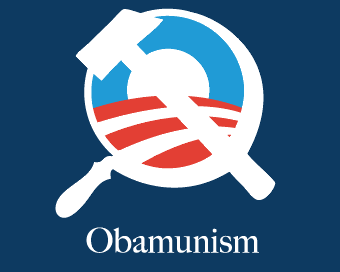

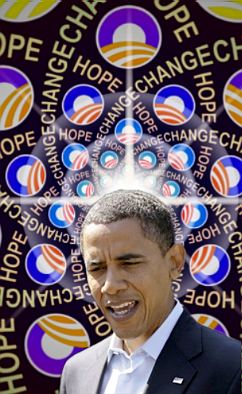 The election results were long expected, but now that the day has arrived it’s quite a letdown, anyway. Reading about the joy expressed by Hamas and Syria and Italy and Indonesia… contemplating Obama’s Secretary of State, or (God help us) Defense… Thinking about the USA becoming just like Sweden, only with a real army, and aircraft carriers, and nukes… First Lady Michelle…
The election results were long expected, but now that the day has arrived it’s quite a letdown, anyway. Reading about the joy expressed by Hamas and Syria and Italy and Indonesia… contemplating Obama’s Secretary of State, or (God help us) Defense… Thinking about the USA becoming just like Sweden, only with a real army, and aircraft carriers, and nukes… First Lady Michelle… Mahmoud Ahmadinejad.
Mahmoud Ahmadinejad.

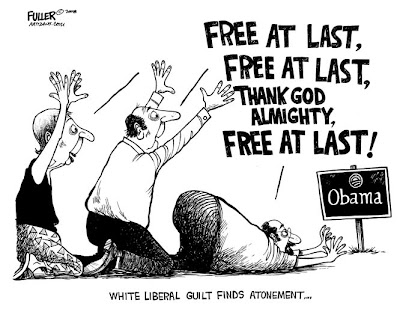


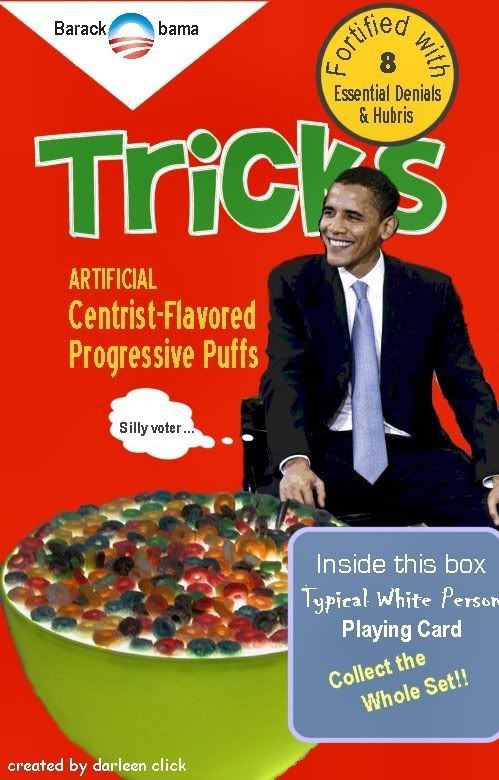







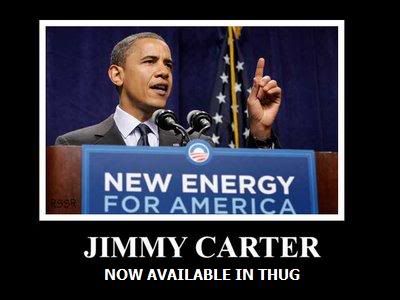







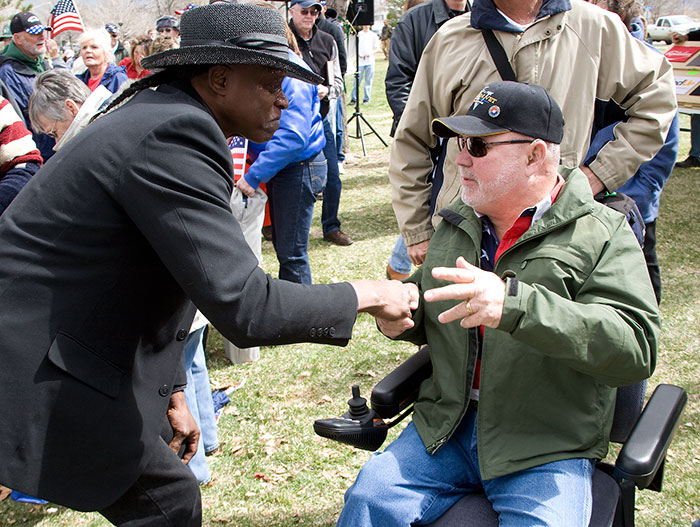










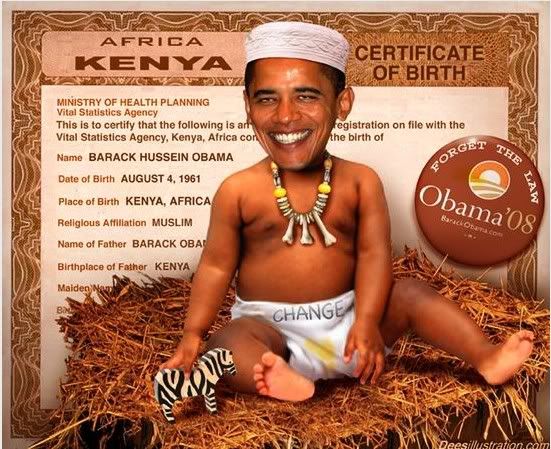







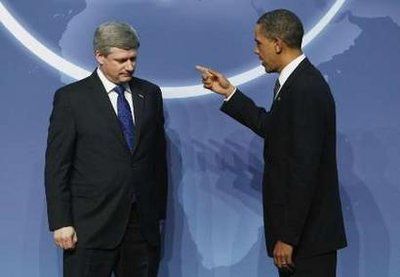

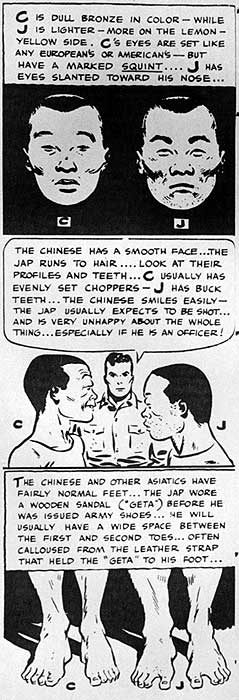


![[image]](http://img.photobucket.com/albums/v637/Rokketmania/Military/bitterclingers.jpg)
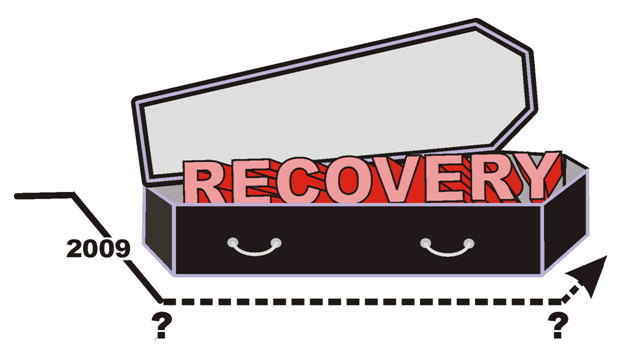
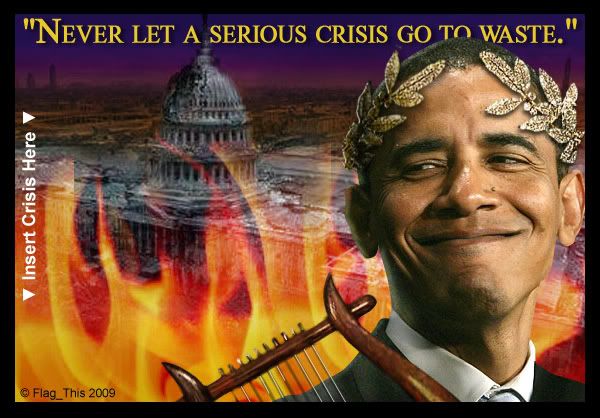









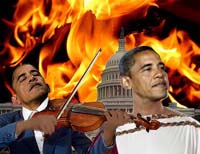


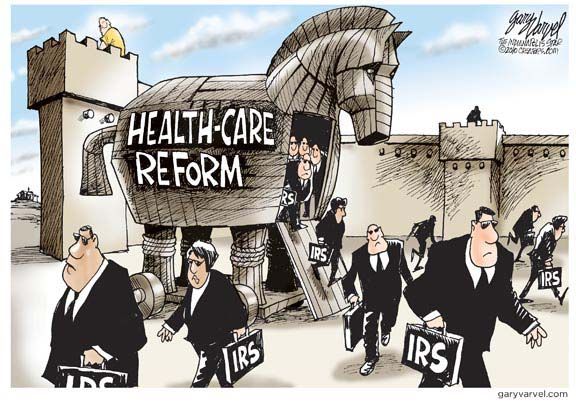






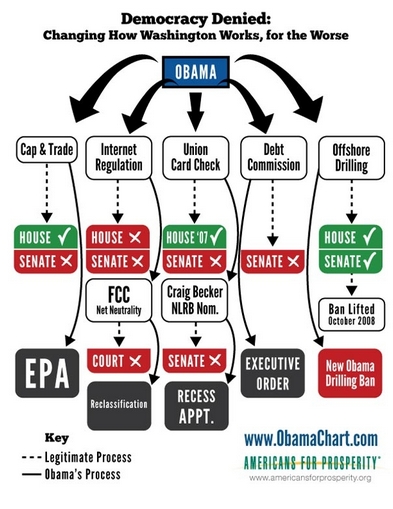












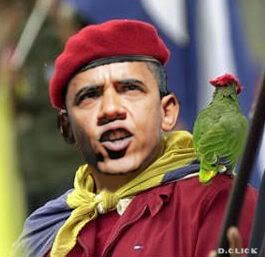
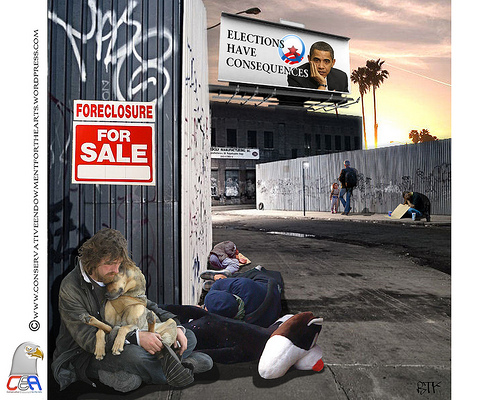


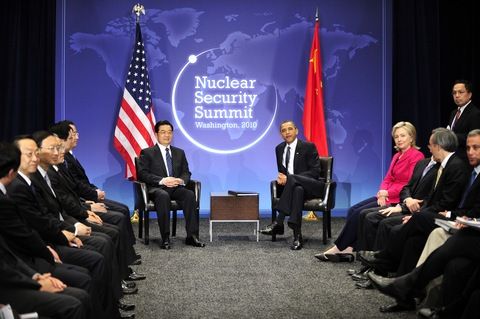


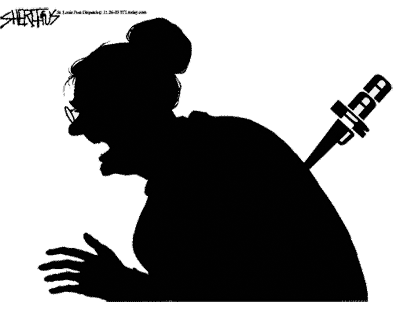
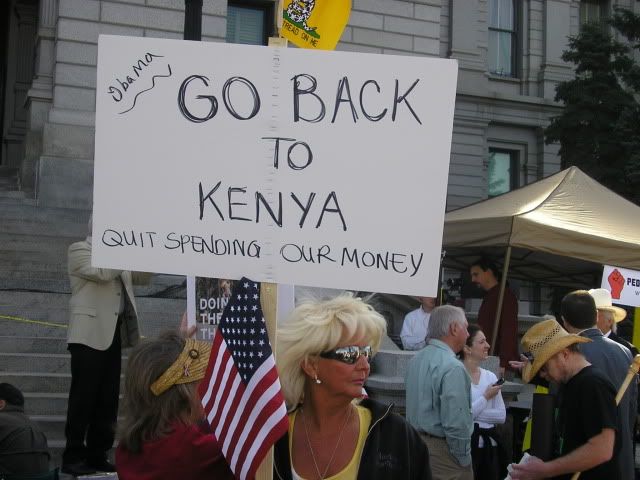
Please…listen to the REAL AGENDA laid out in less 4 minutes…in their OWN WORDS –
http://www.youtube.com/watch?v=ajkAP_M4ZAM
Pass it on…
Two arrested for stealing railroad spikes ( illegals in North Carolina )